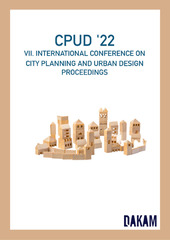Приказ основних података о документу
Introducing the students’ participation, upgrading the curriculum: The case of the course Sustainable City, University of Belgrade - Faculty of Architecture
| dc.creator | Mihajlov, Vladimir | |
| dc.creator | Stupar, Aleksandra | |
| dc.creator | Simić, Ivan | |
| dc.date.accessioned | 2022-11-08T11:43:59Z | |
| dc.date.available | 2022-11-08T11:43:59Z | |
| dc.date.issued | 2022 | |
| dc.identifier.isbn | 978-625-7034-20-3 | |
| dc.identifier.uri | https://raf.arh.bg.ac.rs/handle/123456789/1250 | |
| dc.description.abstract | This paper describes the process applied in the course named Sustainable City (University of Belgrade - Faculty of Architecture, 1st year of master studies) which directly influences its design and further upgrading. By introducing the students’ participation, the curriculum supports their research work which is divided into two phases: reflexive and creative. The first, reflexive phase is focused on the problem analysis targeting the sustainable urban transformation processes. Through the examples selected by students a number of specific urban problems related to different aspects of sustainability are identified and described, as a practical contribution. The second, creative phase introduces the students’ proposals and recommendations for improving the urban environment, tested through a development of a small pilot project (representing the final outcome - exam). Through these two phases students verify their ability for preparing proposals for various research projects and grants, aiming at the desirable transformations of cities via affordable solutions. The design of the course curriculum also enables students to understand the genesis and an impact of sustainable processes on urban development, creating the basis for the knowledge application in both urban planning and design. Simultaneously, this participative approach influences the elaboration of an iterative process in which students provide inputs, i.e. the desirable research topics for curriculum improvement, later included into an updated and upgraded version of the course, implemented in the following school year. The results suggest that through an inclusive learning process, a culture of proactively envisioning a sustainable alternative future is emerging. Most importantly, student participants show their commitment as the agents of potential change to create alternative environmental values and sustainable behavior. | sr |
| dc.language.iso | en | sr |
| dc.publisher | DAKAM BOOKS - Özgür Öztürk DAKAM YAYINLARI, Istanbul | sr |
| dc.relation | info:eu-repo/grantAgreement/MESTD/Integrated and Interdisciplinary Research (IIR or III)/43007/RS// | sr |
| dc.rights | openAccess | sr |
| dc.source | CPUD '22 VII. International city planning and urban design conference : conference proceedings, Istanbul | sr |
| dc.subject | Sustainable City | sr |
| dc.subject | Course | sr |
| dc.subject | Students’ participation | sr |
| dc.subject | Curriculum | sr |
| dc.title | Introducing the students’ participation, upgrading the curriculum: The case of the course Sustainable City, University of Belgrade - Faculty of Architecture | sr |
| dc.type | conferenceObject | sr |
| dc.rights.license | ARR | sr |
| dcterms.abstract | Ступар, Aлександра; Симић, Иван; Михајлов, Владимир; | |
| dc.identifier.fulltext | http://raf.arh.bg.ac.rs/bitstream/id/4318/bitstream_4318.pdf | |
| dc.identifier.rcub | https://hdl.handle.net/21.15107/rcub_raf_1250 | |
| dc.type.version | publishedVersion | sr |

